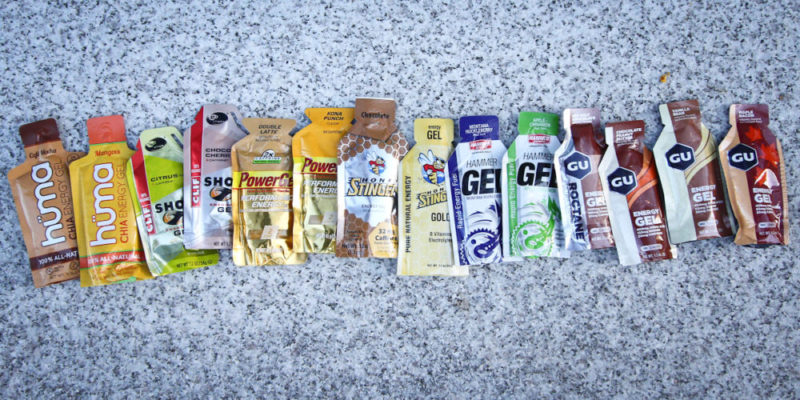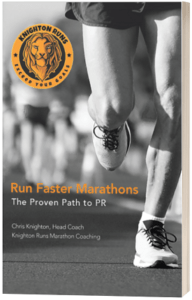Marathon Fueling – The Essential Guide to Run 26.2 Miles Feeling Strong
This post was written by Coach Erica Knighton.

Disclosure: This article may contain affiliate links When you buy through links on our site, I may earn an affiliate commission. As an Amazon Associate I earn from qualifying purchases.
When preparing for a marathon, your physical training is obviously important—racking up the miles, crushing interval workouts, and practicing spending hours on your feet—but you also need to practice your nutrition. Fueling correctly on the run is a crucial part of getting you through 26.2 miles. Coming up with a marathon fueling plan is essential, but practicing that fueling plan is even more important! Proper fueling can be the difference between just finishing the marathon and setting a new PR while feeling great throughout it.
So, how important is it to fuel on your run?
Fuelling on the run becomes very important on runs that are longer than sixty minutes. After running for sixty to ninety minutes, you are running low on glycogen which is the limiting factor for endurance exercise. When you run out of glycogen (our body’s carbohydrate stores), you can’t keep up the intensity and pace of your run.
How often should you eat during a marathon?
It is a very individual thing. The aim of fueling on the run is to maintain blood sugar levels, and how often you need to fuel to enable this will depend on pace, length of run, and your body composition. Whilst fuelling every 30 – 45 minutes would probably suit most runners, there are no hard and fast rules.
Most marathoners would probably want to start refueling after about 45 minutes, then roughly every five miles or thirty minutes depending on your pace. For 3:00ish hour marathoners (or faster), you might want to be fueling more frequently, perhaps every twenty minutes, but that would be something that you have got to find out for yourself in training – establishing what works for you. The faster you run, the more rapidly you deplete your internal energy stores.
Do you need energy gels for a marathon?
Not everyone loves gels, and you definitely don’t need them to fuel your marathon. However, they can be very useful when it comes to running 26.2 miles. I’ve tried many different energy gels over the years and what works for me may not work for you. Everyone reacts differently to gels. For instance, Coach Chris takes GU’s in the “Tastefully Nude” flavor and they work well for him. However, I found they didn’t agree with my delicate GI system, especially during a hot summer training cycle. I prefer a chia seed base of Apple & Cinnamon Huma gels or Maurten 100 gel. Both are incredibly easy on the tummy.
Is caffeine good for long-distance running?
The golden rule with caffeine is to ensure you have tried it during training. Since it’s a stimulant it can help with energy – especially during those last few miles of the marathon. I personally like caffeine for my runs, but I am also a big-time coffee drinker. If you are not up for an espresso shot pre-run, I recommend Run Gum. It will give you a boost without filling your stomach with liquid and acid.
Chris likes to start his marathons with non-caffeinated gels and switch to caffeinated ones in the final third of the race. He likes this strategy for marathon fueling because he finds this keeps him sharp after several hours on the run.
How do you put all of this together to properly fuel for race day?
Here are my top 5 tips to help you develop your marathon fueling plan.
1. Nothing New on Race Day
Don’t try anything on race day that you haven’t practiced during training. It’s not always easy, but test different midrace fuel options, amounts, and timing on your long runs and workouts and take note of what works for you and what doesn’t. Once you find nutrition that works for you, bring it to the starting line.
2. Mid-run Fuel is a Must
Maybe you got by on a few long runs without refueling, but over the course of 26.2 miles, your body will not be able to propel you forward without fueling every 30 to 45 minutes after the first hour. It’s better to have a little extra nutrition stowed away than to not have enough and bonk at mile 18 to 20. To run a marathon to your full potential, you MUST fuel well.
3. Listen to Your Body
While you’re practicing your fueling strategy during long runs, pay attention to how you feel toward the end and once you finish. If you finish feeling good, you likely have a great nutrition plan in place. But, if you feel totally wiped out, try adding 15 grams of carbs per hour. If you finish feeling energized but with GI distress, you probably ate too much, didn’t drink enough water, or need to experiment with other fuel sources.
4. Top Off the Tank
Mid-run fueling will help maintain your energy levels over the course of 26.2 miles, but your pre-race meals are also crucial for success. For the final two to three meals before your race, choose high-carb, moderate-protein, and low-fat and fiber options. The meals should be easily digestible for you. Avoid new foods or overly spiced dishes. Favorites at Casa de Knighton include a pasta dinner, and a bagel topped with a scoop of peanut butter and a banana for a pre-run breakfast.
5. Fueling Doesn’t Stop at the Finish Line
Within 30 minutes post-run, refuel with 15 to 30 grams of protein to prevent further muscle breakdown and kick-start the recovery process. I’m a huge fan of Momentous, it’s the best-tasting chocolate protein mix I’ve tried – no chalky aftertaste. It’s like a yummy milkshake reward after a hard run, and it’s vegan too! Trust me, your body will thank you for the next day if you refuel properly past the finish line.



